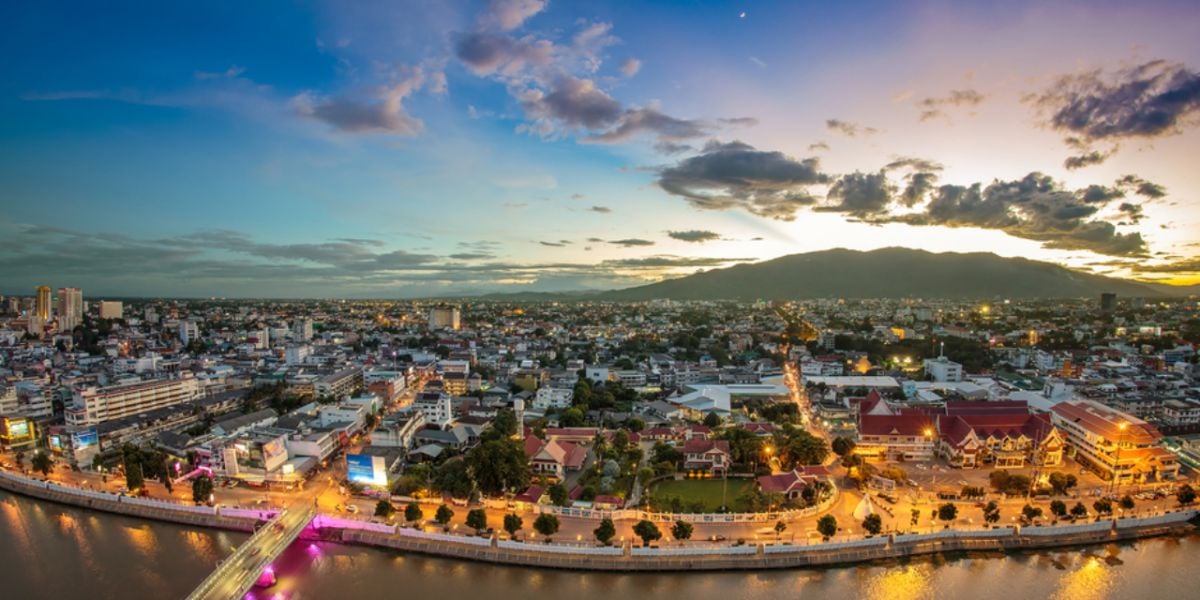
More and more digital nomads, teachers, entrepreneurs, retirees, volunteers, and NGO workers are flocking to the north to make Chiang Mai their home. The list of reasons why so many people are drawn here goes on and on. The cost of living is low, there is little traffic, it offers a relaxed lifestyle and lots of outdoor activities, it is relatively safe, the weather is more comfortable than in other parts of Thailand, and the food is some of the best in the country. It offers great networking opportunities, fast WiFi and 5G connection, and a plethora of coworking spaces.
The city is big enough to keep things interesting, and there are enough bars, restaurants, art galleries, film screenings, cafes, temples, activities, and courses to keep you entertained. However, it is also small enough to quickly get to know the expat community and take a break from the traffic and the fast pace of big city life.
Buy or rent in Chiang Mai
Most expats settled in Chiang Mai opt for long-term rent. While real estate prices in the area are not exorbitantly expensive (especially compared to those in Western countries), buying real estate on a foreign passport is quite complicated.
Foreigners are not allowed to own land outright in Thailand. However, Thai law allows foreigners to buy a condominium as long as they pay for it in foreign currency. Alternatively, foreigners will need to invest at least THB 40 million in the Thai economy to legally be able to purchase a private residence of up to 1,600m² in the country. Those wishing to buy or build their own house usually do so through a Thai spouse, business partner, or half-Thai children.
Due to these restrictions, many foreigners prefer to secure a long-term lease agreement. The law allows leases of up to 30 years, but if you sign a 30-year lease, make sure it is registered so that you will have recourse if your landlord tries to evict you before that time.
Important:
If you decide to purchase real estate in Thailand, you should consult with a lawyer and a real estate agent before making any final decisions.
Good to know:
Leases are only valid for 3 years if they are not registered at the Land Department.
Many leases contain renewal clauses that provide for a renewed 30-year lease once the initial 30-year period comes to an end. A renewal clause is a promise to renew a lease. Still, it is important to understand that it does not always mean an automatic renewal, as your landlord's cooperation is tantamount.
Types of accommodation in Chiang Mai
As more and more buildings aimed at foreigners have been constructed, renting apartments and condos in Chiang Mai has become significantly easier for expats.
The choice of accommodation options is quite good, and there is everything from luxury two-bedroom condominiums with river views to affordable studio apartments. In recent years, there has been a boom in the construction of luxury condos, and as supply still outweighs demand, the monthly rental can be quite competitive, and expats tend to have their pick of the bunch. However, some of the older buildings can still provide the best bargains and are often bigger than newer condos, although they may be lacking in facilities, such as western-style kitchens and lifts.
If you are looking to live near other foreigners, then it is worth considering residing along the river in the city or around the Nimmenhaemin area, which is to the west of the old town. Some of the well-managed apartment buildings in these areas are half-full of foreigners. In fact, they are located close to amenities that appeal to Westerners, such as international restaurants, gyms, and supermarkets.
If you want reassurance that the building you are renting will be well maintained, then it is advisable to rent in one of the newer developments, such as Panna, Convention Condo, Hillside 4, Kharn Khanok, and the Peaks. Renting a condo or an apartment in Chiang Mai often provides greater security than renting a house in the suburbs, as you can lock up and go with fewer worries. There will also be staff working in the building that can help you pay your rent and bills and overcome any language barriers.
However, if you are looking for a garden, more space, and a bit of privacy, then there are plenty of houses to rent in Chiang Mai, and it can be good value to rent a house in the suburbs. For the same price as a condo in town, you can rent a three-bedroom house less than 15 minutes away. Most houses are quite cheap, and some come partly furnished, but you will most likely be expected to maintain the property yourself.
How to find accommodation in Chiang Mai
Steady demand from an increasing number of expats moving to Chiang Mai has resulted in high professional standards among agents, so you need only to ask an estate agency for help in finding a suitable property. It is also worth looking in local newspapers and magazines for accommodation options.
As there are many expats living in Chiang Mai, a lot of them choose to get together on a regular basis. So, if you are moving to Chiang Mai, what better way to get to know the place and get advice than to ask the people who have been through the process of moving there themselves? Check local forums like Chiang Mai Expats. You can also inquire on Reddit and Quora Thailand forums when it comes to the most up-to-date information on rent prices in the city.
While it's a very good idea to start doing your research on Chiang Mai way before your move, it's not a good idea to commit to long-term rent while you are abroad. The best scenario here would be to first book a short stay for several days and then, once you arrive, continue your apartment hunting in Chiang Mai. This way, you will be able to discover more neighborhoods and see what areas of Chiang Mai best reflect your lifestyle.
To start your apartment hunt, check online resources like Chiang Mai Real Estate or Nomad Rentals. When you are in Chiang Mai, you can check the properties you've selected.
Best areas to live in Chiang Mai
Like with many places in Chiang Mai, this question doesn't have just one answer. The best neighborhood for living in Chiang Mai depends on your lifestyle, what you plan to do, where you work, whether you need quick access to coworking spaces and more.
Living in Chiang Mai
Living in the city of Chiang Mai is often referred to as living “within the moat” by locals and long-term expats. “Moat” refers to the area located within the old city. Here, you will have easy access to all the city activities, such as restaurants, markets, bars, and cafes. Here, there are more tourists compared to long-term expats. Keep in mind that this area also tends to get quite busy and noisy, especially during peak tourist times. When it comes to accommodation, you will typically find more basic and Thai-style apartments at home. With that, the prices are on the high end as this is a very commercial area of Chiang Mai, and property is in high demand by local businesses.
Living outside of Chiang Mai
Living outside Chiang Mai is pretty much the opposite of what living inside the city is like. Here, you will find much lower rent and will be able to get a much bigger and better-equipped place for your money. You will also find the suburbs of Chiang Mai much quieter and more laid back compared to the downtown.
The downsides would be fewer dining options, limited coworking spaces, and fewer internet service providers. Another thing to keep in mind is that you will need a motorbike to get around. These are very easy to buy and quite cheap — you can buy a bike for around $300.
Nimmanhaemin
Nimmanhaemin is another option that quite a few expats call home. As you are reading this, there are new condos being built in this area, so you will have a wide choice of accommodation options here. Chiang Mai University is close, and the whole area has a very “young” and active vibe. You will also have access to pretty much anything you might expect from a residential neighborhood: cafes, restaurants, shopping areas, and more. Nimmanhaemin is a very walkable area — but you may still want to get a bike if you plan to venture out downtown often.
How to rent accommodation in Chiang Mai
To rent accommodation in Chiang Mai and generally in Thailand, you will usually need to provide a copy of your passport, a copy of your work permit, and proof of income. If you are renting a property through a real estate agency, you may also be subject to a credit check and be required to provide a character reference from your employer (but these are quite rare).
In most cases, rental agreements are signed for 6 months to 1 year. However, the duration of the lease and the rental price are negotiable with the owner.
Generally, a lease and security deposit are all that is needed to secure property in Thailand. In most cases, you can expect to pay a two-month deposit along with the first month's rent. At the end of the lease, the deposit should be returned as long as the property and furnishings are in good condition. If you leave before the end date of your lease agreement, you will forfeit your deposit unless specified in the contract. Make sure to carefully check the property before signing the lease and take note of any existing damage. It's also standard practice to take inventory of all the furnishings and appliances that the property comes with.
Take note that foreigners are not allowed to use their rented accommodation for commercial purposes and are not allowed to sublease either, as it is a violation of Thai law (Condo Act Sec 17.1 as follows):
"In the case where a space in the condominium is set aside as a place to carry out the business, the system on entering and exiting such an area shall be specifically set up in order to prevent the disturbance of the peaceful enjoyment of the joint owners.
No person shall be permitted to engage in any trade transactions in the condominium except it is a trade transaction in the area of the condominium (designated in accordance with paragraph one) that disallows condominiums and apartments for short-term renting".
Useful links:
We do our best to provide accurate and up to date information. However, if you have noticed any inaccuracies in this article, please let us know in the comments section below.








